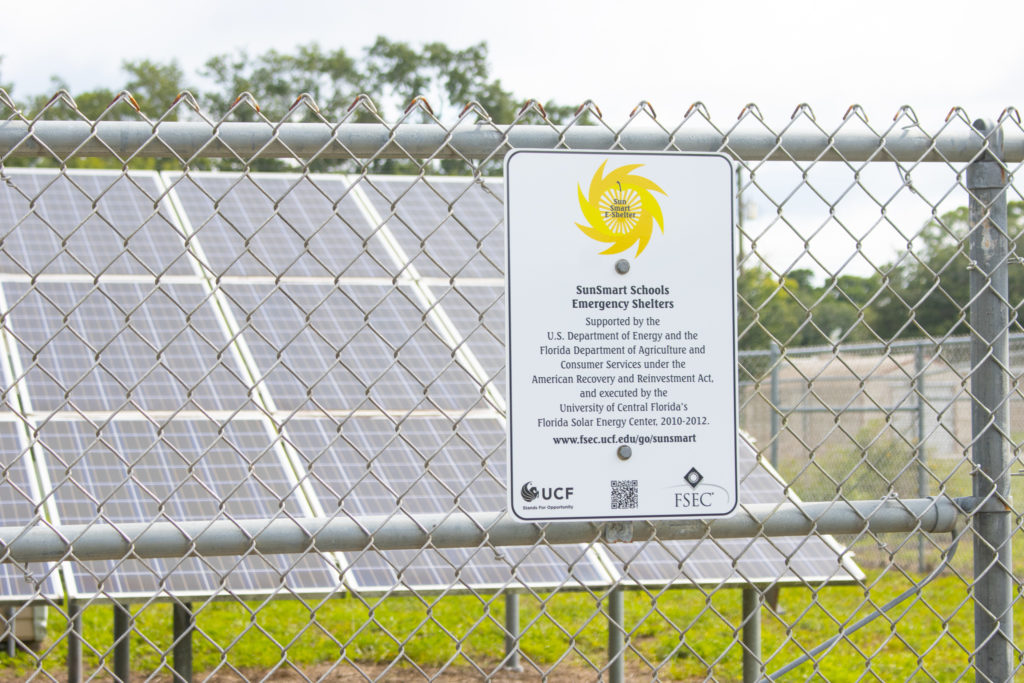Background

The SunSmart E-Shelter Schools program was the first mass deployment of solar with battery back-up on schools that double as emergency shelters in the United States. The goal of the program was two‐fold: educate school facility personnel, teachers and students about photovoltaic technology; and, to install 10,000-watt solar electric (photovoltaic) arrays with battery back‐up at 98 schools throughout 46 counties within Florida that were also designated as emergency shelters. This Solar + Storage approach was the first such project targeting shelter/schools in the nation. With additional funding from two electric utility companies, Duke Energy and Tampa Electric (TECO), a total of 118 such systems were installed by 2015.
Click here to find out how the SunSmart Emergency Shelter works!
In order to ensure that the photovoltaic systems were installed, operated, and maintained in a safe and reliable manner, FSEC and members of Florida’s solar industry worked closely with code officials in nearly every municipality in the state. This effort included:
- Working closely with permitting officials to answer questions about PV technology
- Advising inspectors on recent code changes
- Conducting system installation inspections and provided feedback to installers
- Ensuring that system installers provided on-site training to facility managers
- Training over 100 facility managers on operation and maintenance of the systems
- Ensuring that detailed documentation was provided
- Providing inspection Information
As a result, municipalities and school districts are better able to handle future solar installations.

Installation Details
Year Commissioned: 2012
Services Provided: Backup power, Renewables integration
Supported Infrastructure: Emergency shelters at public schools
Solar: 10kW per system
Storage: 40kWh lead acid battery per system
Project Partners: University of Central Florida’s Florida Solar Energy Center and Florida Office of Energy
Funding
The American Recovery and Reinvestment Act of 2009 (ARRA), through the Florida Department of Agriculture and Consumer Services (FDACS), provided the initial $10 Million in funding.
As the program began to gain momentum, utility partners provided additional $2 million in funding to equip schools not initially selected. In addition to monetary support, SunSmart E-Shelter utility partners provided advice and support in executing interconnection agreements and for municipal permitting for each participating county in Florida.
Starting in 2021, the FDACS provided funding to evaluate the functionality of the systems and then in 2022, provided funding to make the necessary repairs.
Partners

Installing over 100 photovoltaic systems in more than 46 school districts is not a straightforward task. The success of this project is largely due to the strong partnership between the U.S. Department of Energy, State of Florida, Florida Solar Energy Center (FSEC) at the University of Central Florida, the Florida solar industry, and utilities.
This ambitious program brought together school administrators, code officials, teachers and students, solar industry professionals, researchers, and emergency management and utility personnel to create a community of solar advocates throughout the state. The SunSmart E-Shelter Program has added more than one megawatts (MW) of combined photovoltaic generating capacity to Florida using American-made components.
Workforce

At a time when the construction industry was still struggling throughout the U.S., the SunSmart E-Shelter Schools Program worked with seven Florida-licensed solar contractors, and encouraged the creation or retention of jobs in the following industries:
- Fencing, landscaping, and surveying
- Electrical and general contracting
- IT support services
- Custom fabrication
As part of system design and deployment process, the SunSmart team provided training on the latest developments in:
- applicable National Electrical Code rules
- information technology and communications equipment and policies
- emergency power systems and infrastructure
